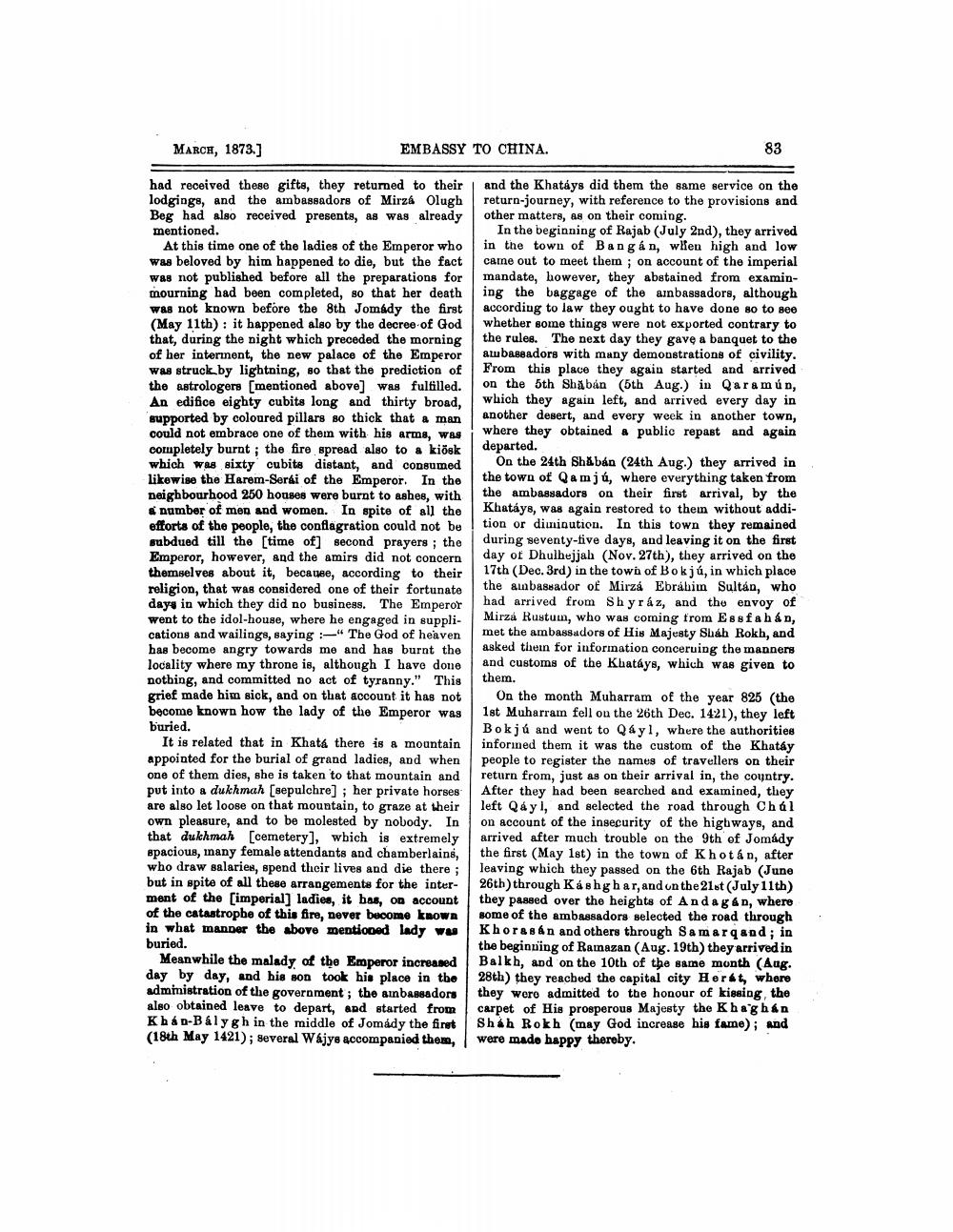________________
MARCH, 1873.]
EMBASSY TO CHINA.
83
had received these gifts, they returned to their lodgings, and the ambassadors of Mirza Olugh Beg had also received presents, as was already mentioned.
At this time one of the ladies of the Emperor who was beloved by him happened to die, but the fact was not published before all the preparations for mourning had been completed, so that her death was not known before the 8th Jomády the first (May 11th) : it happened also by the decree of God that, during the night which preceded the morning of her interinent, the new palace of the Emperor was struck by lightning, so that the prediction of the astrologers (mentioned above) was fulfilled. An edifice eighty cubits long and thirty broad, supported by coloured pillars so thick that a man could not embrace one of them with his arms, W88 completely burnt; the fire spread also to a kioek which was sixty cubits distant, and consumed likewise the Harem-Serai of the Emperor. In the neighbourhood 250 houses were burnt to ashes, with & number of men and women. In spite of all the efforts of the people, the conflagration could not be subdued till the time of] second prayers ; the Emperor, however, and the amirs did not concern themselves about it, because, according to their religion, that was considered one of their fortunate days in which they did no business. The Emperor went to the idol-house, where he engaged in supplications and wailings, saying " The God of heaven has become angry towards me and has burnt the locality where my throne is, although I have done nothing, and committed no act of tyranny." This grief made him sick, and on that account it has not become known how the lady of the Emperor was buried.
It is related that in Khaté there is a mountain appointed for the burial of grand ladies, and when one of them dies, she is taken to that mountain and put into a dukhmah (sepulchre] ; her private horses are also let loose on that mountain, to graze at their own pleasure, and to be molested by nobody. In that dukhmah [cemetery], wbich is extremely spacious, inany female attendants and chamberlains, who draw salaries, spend their lives and die there ; but in spite of all these arrangements for the interment of the [imperial] ladies, it bas, on account of the catastrophe of this fire, never become known in what manner the above mentioned lady was buried.
Meanwhile the malady of the Emperor increased day by day, and his son took his place in the administration of the government, the ambassadors also obtained leave to depart, and started from Khád-Bálygh in the middle of Jomády the first (18th May 1421); several Wájye accompanied them,
and the Khatáys did them the same service on the return-journey, with reference to the provisions and other matters, as on their coming.
In the beginning of Rajab (July 2nd), they arrived in the town of Bangán, wlfen high and low came out to meet them ; on account of the imperial mandate, however, they abstained from examining the baggage of the ambassadors, although according to law they ought to have done so to see whether some things were not exported contrary to the rules. The next day they gave a banquet to the ambassadors with many demonstrations of civility. From this place they again started and arrived on the 5th Shăbán (5th Aug.) in Qaramún, which they again left, and arrived every day in another desert, and every week in another town, where they obtained a public repast and again departed.
On the 24th Shåbán (24th Aug.) they arrived in the town of Qamjú, where everything taken from the ambassadors on their first arrival. by the Khatáys, was again restored to thein without addition or diminution. In this town they remained during seventy-five days, and leaving it on the first day of Dhulhejjah (Nov. 27th), they arrived on the 17th (Dec. 3rd) in the town of Bokjú, in which place the ambassador of Mirza Ebrábim Sultán, who had arrived from Shyráz, and the envoy of Mirza Rustum, who was coming from Esfahán, met the ambassadors of His Majesty Shah Rokh, and asked then for inforination conceruing the manners and customs of the Khatays, which was given to them.
On the month Muharram of the year 825 (the 1st Muharram fell on the 26th Dec. 1421), they left Bokjú and went to Qúyl, where the authorities inforined them it was the custom of the Khatáy people to register the names of travellers on their return from, just as on their arrival in, the country. After they had been searched and examined, they left Qáyl, and selected the road through Chál on account of the insecurity of the highways, and arrived after much trouble on the 9th of Jomády the first (May 1st) in the town of Khotán, after leaving which they passed on the 6th Rajab (June 26th) through Káshgh ar, and on the 21st (July 11th) they passed over the heights of Andag &n, where some of the ambassadors selected the road through Khoreshn and others through Samarqand; in the beginning of Ramazan (Aug. 19th) they arrived in Balkh, and on the 10th of the same month (Aug. 28th) they reached the capital city Herit, whore they wero admitted to the honour of kissing, the carpet of His prosperous Majesty the Kha'g hán Shah Rokh (may God increase his fame); and were made happy thereby.




